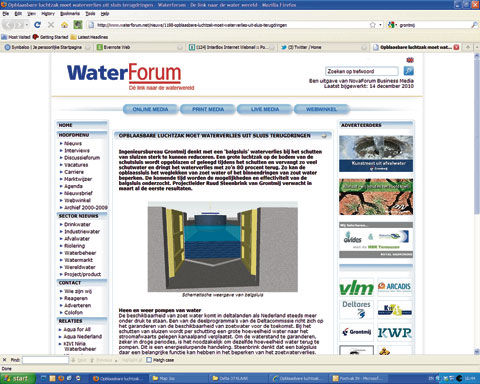A bellows lock could reduce the loss of fresh water by 80 percent and also reduce the penetration of salt water into inland waters, reports Waterforum Online.
/p>
When a ship comes into a lock, the bellows will be pumped up until the water level in the lock equals that on the higher side. Once the ship is inside the lock, the doors close, air escapes from the bellows, and the water level drops to the level on the lower side. Owing to this operation, once the ship has left the lock hardly any water has been lost. For seaside locks, the bellows lock’s elevated floor offers yet another advantage, says Grontmij. Salt water, owing to its higher density, intrudes into sweet water like a salt tongue slipping across the floor. The elevated bellows however acts like a threshold, stopping the salty inflow.
Sounds plausible, doesn’t it? Still, Wilfred Molenaar (MSc), a lecturer in Hydraulic Structures at the faculty of Civil Engineering and Geosciences, is not impressed. He acknowledges the bellows lock could save fresh water, but it does so at great expense. Grontmij claims the lock saves energy as well, because in times of water shortages, water does not need to be pumped back to the higher level. But Molenaar points out that pumping up the bellows also requires energy. It’s hard to tell what the net energy savings will be, but certainly less than the amount Grontmij claims.
What about the bellows blocking the salt tongue? In principle it could work, Molenaar says, but the effects will need to be measured. And for that, you would need a prototype.
Molenaar sees some other drawbacks. “Ever tried to push a football under water?” he asks. The lifting force on the bellows on the locks floor will be enormous, and the results of its tearing loose disastrous. Anchoring the bellows will demand major adaptations to the lock’s structure, and its fabric will remain a fragile structure. A ship’s keel or propeller could easily tear it and reduce the lock to its original workings. On top of that, repair works would block the lock, which is an essential part of the waterways, for days or weeks.
In short, Molenaar does not believe there’s a great future for the bellows lock. In his view, the adaptation of an existing lock will be costly and the benefits tiny. “It’s easier to just pump the water back up,” Molenaar says.
Ineens was daar Bewonersorganisatie Wippolder Zuid. Waarom nu?
“Omdat er veel problemen in de wijk heersen en komen in de toekomst. En omdat een formele gesprekspartner, een organisatie, er niet was. Daarom is er sinds 22 januari een vereniging. Uit het volk. Ik woon hier al mijn hele leven.”
Over welk gebied hebben we het?
“Wippolder Zuid is de Professorenbuurt. Grenzend aan de TU. Zeg maar alles binnen de Schoemakerstraat, Nassaulaan, Jan de Oudeweg en het Delftechpark achter de Professor Evertslaan.”
Wie of wat vormt de bedreiging?
“Dat er in de toekomst betaald parkeren komt: de TU wil dat invoeren. We hebben hier nooit een parkeerprobleem, dus ze gaan mensen op kosten jagen. Daar komt bij: er verdwijnen parkeerplaatsen. Ze gaan de riolering vervangen en het straatmeubilair herindelen. Over twee jaar zijn we dan ongeveer honderd plaatsen kwijt. Dan wordt het wel een probleem, want er gaan oude mensen zonder auto weg en de huizen worden verkocht aan jonge starters die een auto hebben.”
Wat is een andere zorg?
“We hebben jongeren waar mensen last van hebben. Wij willen meepraten over een oplossing. Het jongerencentrum is maar zestien uur per week open, dus ze hangen rond en gaan met een autootje rondrijden.”
En nog iets?
“De sloop van woningen aan de Ernst Casimirstraat en de Professor Telderslaan. Wij willen dat die huurders weer een acceptabele, goedkope, sociale huurwoning krijgen.”
Hoe gaan jullie het aanpakken?
“Contact zoeken met bewoners. Een avond organiseren in het buurthuis, over alles: parkeren, jongeren, riool, herinrichting straatmeubilair. Proberen contact te leggen met woningcorporaties, wijkagent, gemeente, iedereen die met Wippolder Zuid te maken heeft. We hebben al een goed gesprek gehad met de opbouwwerker.”
Zeker al overleg met de TU gehad over het parkeren?
“Nee. We moeten alles uit de pers halen.”
En met de gemeente?
“Ja. Met de opbouwwerker dus. En volgende week overleggen we met de wijkcoördinator. Maar echt contact leggen met het gemeentebestuur doen we na de verkiezingen in maart. Dat beginnen ze met een schone lei. Nu met de wethouder afspraken maken heeft weinig zin.”
Jullie trekken op met andere bewonersorganisaties?
“We zoeken contact met TU Noord. Dat ziet er nu al goed uit, want op hun website staat een felicitatie aan ons vanwege de oprichting van de vereniging. Samen willen we zo veel mogelijk parkeerplekken behouden. En samen gaan we in gesprek met Breed Welzijn Delft, de beheerder van het buurthuis, het jongerencentrum en zo.”
Wat willen jullie over een jaar hebben bereikt?
“Over een jaar gebeurt er niets meer in de buurt zonder dat wij het weten. Maar eerst willen we een stabiel verenigingsbestuur op poten zetten. We gaan de mensen verenigen die nu nog alleen opkomen voor hun straat en argumenten formuleren voor onze doelen. Als stabiel bestuur kunnen we dan een goede gesprekspartner voor de gemeente zijn.”



Comments are closed.